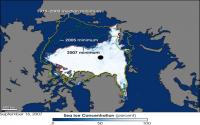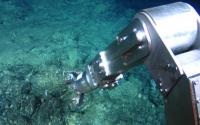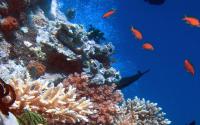News: By Source

The oldest and thickest sea ice in the Arctic has started to break up, opening waters north of Greenland that are normally frozen, even in summer. This phenomenon – which has never been recorded before – has occurred twice this year due to warm winds and a climate-change driven heatwave in the northern hemisphere.
[ More ]
Ambitious research aims to limit environmental damage on the sea floor – but some scientists fear mining this pitch black world will do more harm than good.
[ More ]
The Arctic’s ice is disappearing. We must reduce emissions, fast, or the human castastrophe predicted by ocean scientist Peter Wadhams will become reality
[ More ]
A scientific expedition has been launched from the UK to explore the mining of rich metal deposits on the deep ocean floor, which are the focus of a new gold rush around the world.
[ More ]
The prospect of a race to the bottom of the ocean – a 21st-century high seas version of the Klondike gold rush – has alarmed scientists. The oceans, which make up 45% of the world’s surface, are already degraded by overfishing, industrial waste, plastic debris and climate change, which is altering their chemistry. Now comes a new extractive industry – and scientists say governments are not prepared.
[ More ]
US secretary of state John Kerry called for expanding the world’s marine reserves by a factor of 10 on Tuesday, signalling a bolder new US approach to international environmental protection.
[ More ]
The Cook Islands hopes to transform itself into one of the world's richest countries within a decade by sending robots to the sea floor to collect minerals that it believes are worth tens of billions of dollars.
[ More ]
Rapid thawing of the Arctic could trigger a catastrophic "economic timebomb" which would cost trillions of dollars and undermine the global financial system, say a group of economists and polar scientists.
[ More ]
David Cameron has pledged to put Britain at the forefront of a new international seabed mining industry, which he claimed could be worth £40bn to the UK economy over the next 30 years. But the prime minister has chosen an American defence company – Lockheed Martin – to spearhead the drive to collect from the depths of the ocean the copper, nickel and rare earth minerals used in mobile phones and solar panels.
[ More ]
India has joined the race to explore and develop deep-sea mining for rare earth elements — further complicating the geopolitics surrounding untapped sources of valuable minerals beneath the oceans.
[ More ]